SEO services cannot create demand where there is none.
But when done right, SEO can funnel new visitors to your business around the clock.
If you own a business, chances are you’d like to make more money. You’ve probably found the tried and true marketing tactics that once were the go-to for small businesses (think Yellow Pages) are no longer relevant.
People use search engines. In fact, people are searching on Google to the tune of over 2 billion searches per day. That’s more than 50,000 searches per second! Google (and to a lesser degree, other search engines) are the modern day version of the Yellow Pages. Back then a front page listing meant more calls, much like being on the first page of Google means more clicks.
High rankings put you at the top of wherever your product or service appears.
From a branding perspective, this is an extremely powerful place to be. From a business standpoint, a top listing means the lion’s share of traffic goes to you.
Said another way: more traffic > more visitors > more leads > more sales. It’s purely a math game.
Don’t think SEO matters? Think again:
- 93% of online experiences begin with a search engine
- 60% of all organic clicks go to the organic top 3 search results
- 75% of users never scroll past the first page of search results
There are endless reports and case studies that back this data up.
A study by Search Engine Watch found that mobile searches for local products and services resulted in purchases 61% of the time.
Another study compared the “close” rates of leads from search engines to direct mail and print advertising. Guess which channel performed better?
SEO leads were closed at a rate 9x higher than print!
As you can see, in today’s world, SEO has actually become a core sales tactic that most serious brands should be exploring.
How Do I Find the Best SEO Services?
I’m sure you need no convincing that higher rankings can have a dramatic impact on your business. The hard part is figuring out how to get there. You can do it yourself or outsource to another company, but regardless which decision you make it takes a bit of legwork to find the best SEO services.
How to get started:
Step #1 – Define your needs: Are you capable of carrying out the work yourself? A consultant might make the most sense. They can work with you to put together a strategy and let you take it from there.
Are you comfortable with writing and doing link building, but need technical help? Hiring a company to audit your site and make the necessary fixes gives you a solid foundation. If this sounds like your situation, you’re better off hiring someone for a one-off project. Once the technical fixes are in place, they can pass the ball back to you.
Here’s the truth: If you don’t have the time to commit to link building or creating content, you’re going to need someone to manage your SEO.
Step #2 – Know your budget: The price of SEO services can vary wildly. The average hourly cost of an SEO consultant is typically no less than $100 per hour if you are working with an agency.
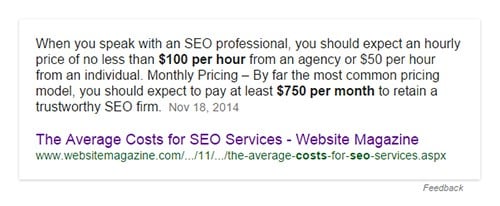
Most businesses should expect to pay at least $750 per month on SEO.
Of course, there are different pricing models.
Pay for performance focuses on delivering rankings first, but regardless of how you decide to invest, choosing the right SEO company will be the deciding factor in your success.
The only way to make the right decision is to know your monthly budget and understand that, for the most part, SEO takes time. You should be prepared to invest in a solid SEO campaign for at least six months.
Step #3 – Ask for recommendations: Asking friends and colleagues for recommendations is always a good start. You may find a company that has done some good work for someone you know.
You can also attend a local Meetup. You’ll be able to mingle with people in your community and get recommendations from local business owners.
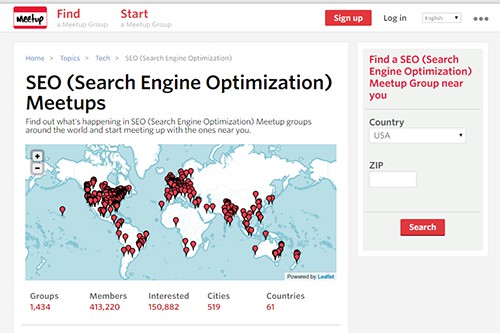
Step #4 – Reach out to companies: Whether you’ve narrowed down your list through recommendations or a few Google searches the next step is reaching out and setting up a time to talk.

Later on in the article I highlight some important questions you should be asking.
Step #5 – Test their services: Most SEO companies are not going to let you test their services upfront. But that’s not to say that you shouldn’t ask. Chances are you’ll get a free site audit or keyword analysis.
Note: We are one of the few SEO companies that work on performance. We provide our services first and allow our customers to pay after their rankings go up.
What to look for:
Asking the right questions will help you weed out companies that are not a good fit. A face to face conversation or a phone call with a prospective SEO company is what I recommend. This way you have a chance to ask tough questions and get answers on the spot.
Talking to companies directly over the phone, in person, or over Skype eliminates the risk that any question you ask over email just gets an answer pulled off Google.
Here are some questions you should ask:
“How many years have you been in business?”
If a company has been in business for years, it’s obviously a good sign. While this doesn’t mean a younger company cannot do good work, a company that‘s been in business for awhile has the experience and have proved they can operate a sustainable business. Some freelancers can do great work, but their personal lives, financial situation, or workload can negatively impact their ability to deliver on their word.
“What is your area of expertise?”
There are three main “buckets” of expertise in SEO:
- Technical SEO – website structure, indexation, and schema markup
- On-page SEO – keywords, content, HTML tags, title/meta descriptions
- Off-page SEO – link building, influencer outreach, earned mentions
Some companies will be more of a ‘one-stop shop’, while others may only focus on their core strengths. Choosing a company that aligns with your goals is what’s important.
“What is your track record?”
A good SEO company will have ranked plenty of sites and have the proof and testimonials to back up their claims. Look for published case studies or testimonials from current customers.
There are plenty of questions you can ask, but another good rule of thumb is to evaluate their site and check their rankings. Ask them what keywords they target and how they’re current position on those keywords.
If they don’t rank prominently for keywords related to their own website, there’s a good chance they won’t be able to help you either.
What to watch out for:
- Are they able to answer questions confidently? If you get vague responses to your questions then you should see this as a red flag.
- Do they openly sell “backlinks”? If a company openly promotes a service that goes directly against Google’s guidelines, you should think twice before doing business with them.
- Is their contract complicated? If the contract is restrictive and highly one-sided then chances are this is the only way they can hang onto clients. A good SEO company will focus more on keeping you happy versus keeping you in a contract.
Using SEO Services To Increases Traffic and Sales
Now that we’ve covered the basics on why SEO is important and how to find a reputable SEO company, let’s cover how SEO actually increases your bottom line.
Technical and on-page SEO form the foundation.
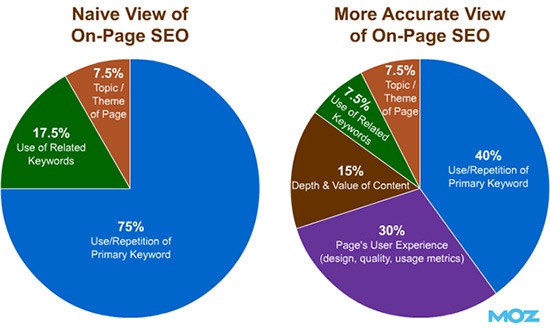
If you want your website to perform well in search, it’s important that search engines are able to crawl your site. On the technical side, this means having good site structure and the proper HTML markup. And of course, schema markup and social meta data.

The structure of your website plays a critical role in how Google crawls and indexes your site. The best way to structure content on your site is by “siloing” your content. This keeps it tightly focused around the theme of your site and helps you build up related content to give your main pages as much SEO juice as possible.
Here is an explanation from Quora that describes the strategy:
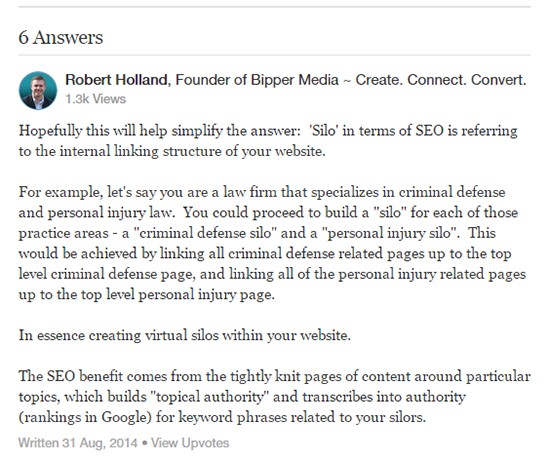
Key components of on-page optimization:
- Organized content that is well structured
- Crawlable pages that can be indexed by search engines
- Proper HTML markup and syntax (including schema) on all pages
Detailed buyer personas and keyword research shape the focus.
Knowing who your ideal customers are helps shape the content for your site and helps you create messaging that will resonate with your audience.
A good keyword strategy has multiple layers. The most important keywords are action-oriented. They focus on buyer intent.
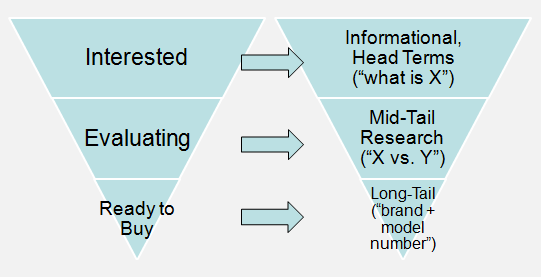
(source)
Your keyword strategy will also include a mix of high volume search queries, brand terms and may even target brand or product names associated with your competitors.
Key components of keyword research:
- Targeting a mix of keywords that focuses on volume and buyer intent
- Mapping keywords to pages and optimizing each page
- Prioritizing work around keywords that add to your bottom line
Competitor analysis and creativity forge the strategy.
Competitive analysis is the backbone of most SEO campaigns. By looking into what your competitors are doing you can shortcut your way to success and understand what strategies are working for them.
There are a number of SEO tools that you can use to spy on your competitors.The SEO specialist you are working with will more than likely use a combination of tools to audit your competitors’ websites and dig into their link profile and keyword usage.
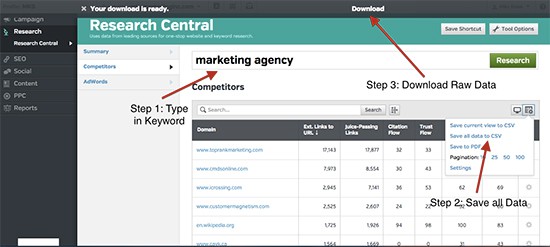
Of course, tools alone can’t solve everything. You still need to be able to recognize trends and analyze the information you’re seeing to create an actionable strategy. No tool will give you that. You need someone who has an intimate understanding of how search works.
Campaign performance and rankings track progress.
There are a handful of metrics that are crucial to track. A good SEO company will be proactive in sending reports so you can see where your site is ranking.
If you haven’t installed Google Analytics, you should do that now. If you already have Google Analytics installed, you can check how much traffic you are getting from search engines. This will give you an idea if the SEO services you are paying for are worth it.
To do that, what you want to do is visit the Audience Overview screen in G.A. and then click on Add Segment. Afterwards, check the Organic Traffic option and click “Apply”.

You’ll now be able to see how many visitors find your site through organic search. There is plenty more you can do with Analytics.
The video below covers more reports you can use to see how your website is performing.
Should You Pay for SEO Services?
Ultimately, if you have a business with hopes of attracting more customers online, you should invest in SEO if you can’t do the work yourself. Search traffic converts far better than other channels. Think about what you do when you want to buy something or need information: are you typing into Google or picking up the phone book?








